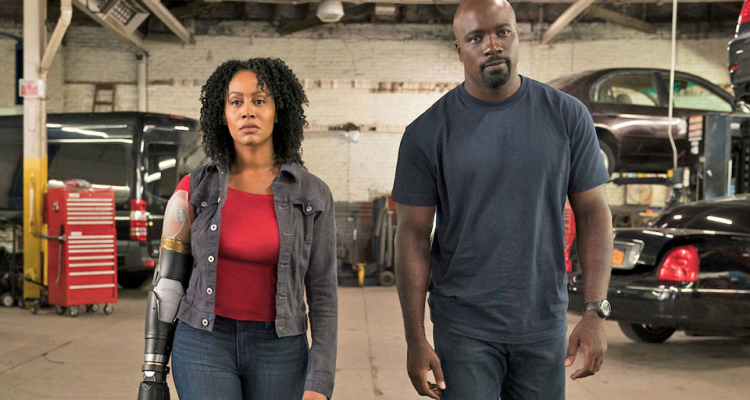The Bingeworthy Breakdown is an occasional look at new TV shows. Over 500 scripted seasons of TV are expected to air in 2018, and to help you sort the wheat from the chaff, we’re going to give you the lowdown to help you work out whether it’s worth tuning in every week for them or waiting to binge later. Today, we look at season two of Netflix‘s “Marvel’s Luke Cage.”
Set in the Marvel Cinematic Universe as part of Netflix’s series of series, “Luke Cage” follows the titular muscle-bound, bulletproof superhero, played by Mike Colter, as he tries to wrest his native Harlem back from the criminals who claim it as their territory.
What’s different about season two from the show’s first year?
Mostly Luke Cage himself. His name is now clear and he’s become a celebrity, so much so that there’s a tracking app where people share sightings of the hero (that for some reason the villains don’t use when they’re trying to find him). The sweet, “corny” guy of the previous season is gone – when it suits what the writers are trying to do, putting his relationship with his full-time girlfriend and part-time superhero nurse, Claire (Rosario Dawson, showing up whenever the budget allows), into jeopardy. He’s also now a sometimes petty jerk who damages a connected driver’s car just because he can and scares the people who care about him. I get that nice guys are often seen as narratively boring – with the best exception being my Marvel boyfriend Steve Rogers – but Luke’s personality shift feels unearned and unnecessary. He’s not the guy we knew and loved from the superior season one, and his arc doesn’t feel warranted.
Though he’s been cleared of the crime that he was framed for, he’s still at odds with the local cops, other than Detective Misty Knight (Simone Missick). After losing her arm in “The Defenders,” she struggles with finding her place professionally as she tries to recover emotionally and physically after the injury. She’s the most likely one here to get a “The Punisher“-style spinoff, but the writers still don’t give her as much as they did in the first season.
Heroes blah blah blah. I’m here for the villains.
I’m with you. Marvel’s Netflix shows have often lived or died by their big bads. Jessica Jones‘ first season was great in large part due to David Tennant‘s Kilgrave, and Vincent D’Onofrio‘s Kingpin buoyed “Daredevil.” For “Luke Cage,” season one took a quick dive when it dispatched Mahershala Ali‘s Cottonmouth, losing one of its best actors and characters in a single moment midway through the season, replaced by an over-the-top Diamondback, and this season’s villains don’t ever reach the same heights as Ali.
Mariah Dillard (Alfre Woodard) is still a Harlem fixture, but she wants out of her life of crime. She’s looking for a buyer for her arsenal of weapons so she can go straight, particularly with the arrival of her daughter, Tilda (Gabrielle Dennis). After a kiss at the end of season one, her romance with righthand man Shades (the actual worst) (Theo Rossi, also the actual worst) is blossoming, but it doesn’t help her attempts at legitimacy.
Woodard is great, as always, in everything, but the show does her no favors. Most of her scenes are with that fucker Shades, and Rossi’s acting is terrible and can’t elevate his poorly written character. Pairing Rossi and Woodard highlights his high school-level acting and shows what a queen she is, but she’s the only one having fun here, either on screen or in the audience.
Season two also introduces a new villain, John McIver aka Bushmaster (Mustafa Shakir), who the press notes describe as “brimming with charisma” (He’s not). The leader of a Jamaican gang in Brooklyn, Bushmaster has his sights set on expanding into Harlem and he can go blow for blow with Luke. It keeps the fight scenes from being entirely people shooting at Luke Cage and bullets ricocheting back, but they’re nothing like the best brawls in “Daredevil” or even “Jessica Jones.” They beat out the action scenes in “Iron Fist” because at least neither Colter and Shakir are Finn Jones.
But what is this season actually about?
Your 11th grade English teacher is proud that you care about the show’s themes. With all the subtlety of one of Luke Cage’s punches, the show beats its messages into the audience. With Mariah’s daughter and Luke’s father (the late, great Reg E. Cathey), the season is focused on the past’s effects on the present as well as parental relationships. It also questions the nature of heroes and villains, introducing larger flaws into Luke and giving Mariah the option to go clean.
So it sounds like you didn’t like it that much. How many episodes did you make it through?
Seven. Netflix was kind/cruel enough to provide all 13 episodes in advance, versus giving critics about half of a season, which they’ve done in the past. After it opens with Mobb Deep‘s “Shook Ones” in the season premiere, the first three episodes are a slog, and the next four are better but still has the standard Netflix/Marvel struggle with pacing. These seasons should never be 13 episodes, and that’s particularly clear in a plot that is introduced to give Luke something to do other than fight, but it ends up pointless only a few episodes later when everyone involved in the plot is dead.
Could it get even better after episode seven?
Maybe? But I’m not in any hurry to find out. [C]

